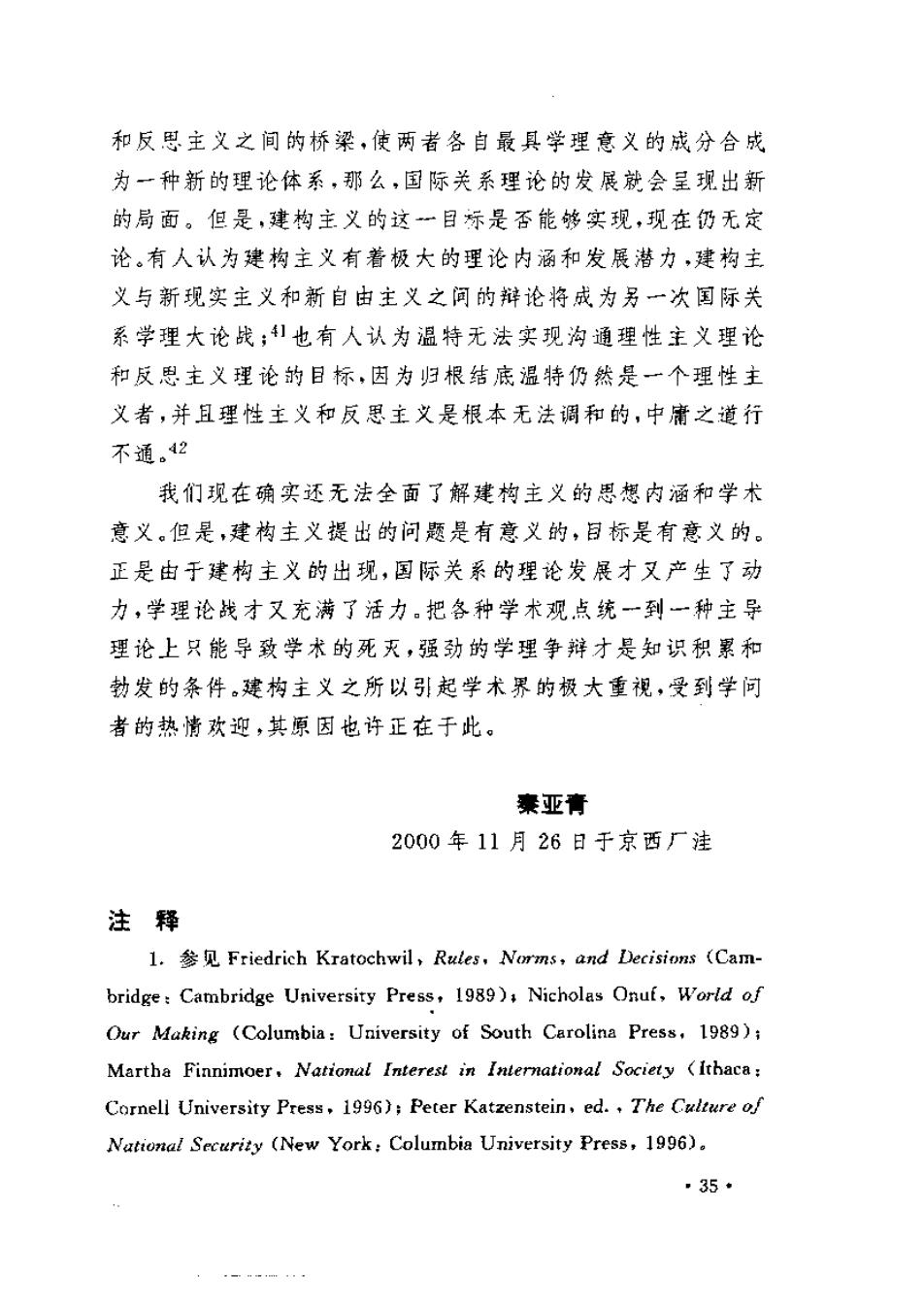
和反思主义之间的桥梁,使两者各自最具学理意义的成分合成 为一种新的理论体系,那么,国际关系理论的发展就会呈现出新 的局面。但是,建构主义的这一目标是否能够实现,现在仍无定 论。有人认为建构主义有着极大的理论内涵和发展潜力,建构主 义与新现实主义和新自由主义之间的辩论将成为另一次国际关 系学理大论战;!也有人认为温特无法实现沟通理性主义理论 和皮思主义理论的目标,因为归根结底温特仍然是一个理性主 义者,并且理性主义和反思主义是根本无法调和的,中庸之道行 不通。42 我们现在确实还无法全面了解建构主义的思想内涵和学术 意义。但是,建构主义提出的问题是有意义的,目标是有意义的。 正是由于建构主义的出现,国际关系的理论发展才又产生了动 力,学理论战才又充满了活力。把各种学术观点统一到一种主导 理论上只能导致学术的死灭,强劲的学理争辩才是知识积累和 勃发的条件。建构主义之所以引起学术界的极大重视,受到学问 者的热情欢迎,其原因也许正在于此。 素亚膏 2000年11月26日于京西厂洼 注释 1.Friedrich Kratochwil,Rules,Norms,and Decisions (Cam- bridge:Cambridge University Press,1989):Nicholas Onuf,World of Our Making (Columbia:University of South Carolina Press,1989); Martha Finnimoer,National Interest in International Society (Ithaca: Cornell University Press,1996);Peter Katzenstein,ed.,The Culture of National Security (New York:Columbia University Press,1996). ·35·
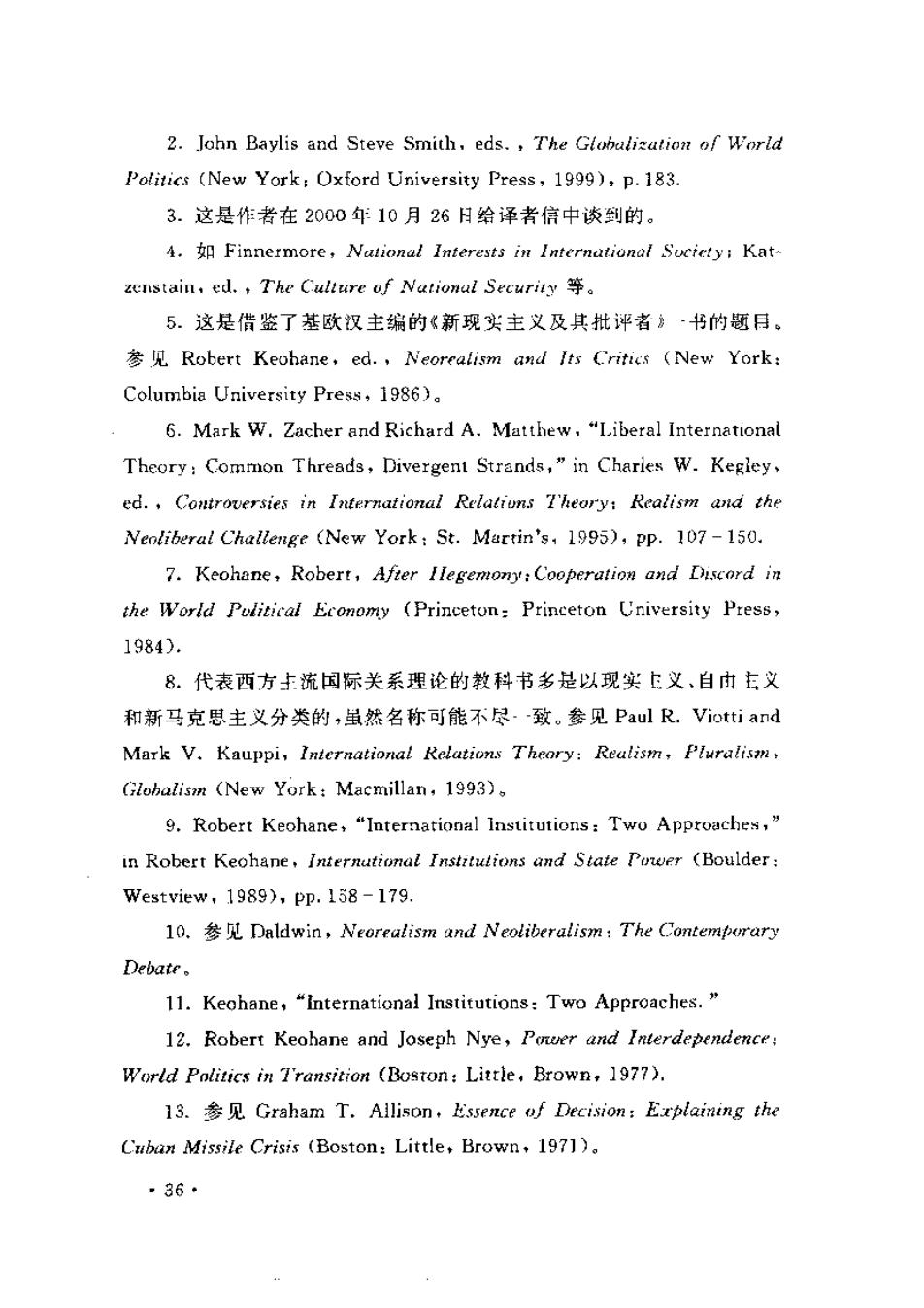
2.John Baylis and Steve Smith,eds.,The Globalization of World Politics (New York:Oxford University Press,1999),p.183. 3.这是作者在2000年10月26日给译者信中谈到的。 A.Finnermore,Nutional Interests in International Suciety:Kat- zenstain,ed.,The Culture of National Security 5.这是借鉴了基欧汉主编的《新现实主义及其批评者》~书的题目。 Robert Keohane,ed.,Neorealism and Its Critics (New York: Columbia University Press,1986)a 6.Mark W.Zacher and Richard A.Matthew,"Liberal International Theory:Common Threads,Divergent Strands,in Charles W.Kegiey, ed.Controversies in International Relatiuns Theory:Realism and the Neoliberal Challenge (New York:St.Martin's,1995),pp.107-150. 7.Keohane,Robert,After llegemon:Cooperation and Discord in the World Political Economy (Princeton:Princeton University Press, 1984). 8.代表西方手流国际关系理论的教科书多是以现实上义、自内主义 和新马克思主义分类的,虽然名称可能不尽·致。参见Paul R.Viotti and Mark V.Kauppi,International Relations Theory:Realism,Pluralism, Globalism (New York:Macmillan,1993) 9.Robert Keohane,"International Institutions:Two Approaches," in Robert Keohane,Internutional Institulions and State Power (Boulder: Westview,1989),Pp.158-179. 10.Daldwin,Neorealism and Neoliberalism:The Contemporary Debate。 11.Keohane,"International Institutions:Two Approaches. 12.Robert Keohane and Joseph Nye,Power and Interdependence: World Politics in Transition (Boston:Little,Brown,1977). 13.Graham T.Allison,Essence of Decision:Explaining the Cuban Missile Crisis (Boston:Little,Brown,1971). ·36·
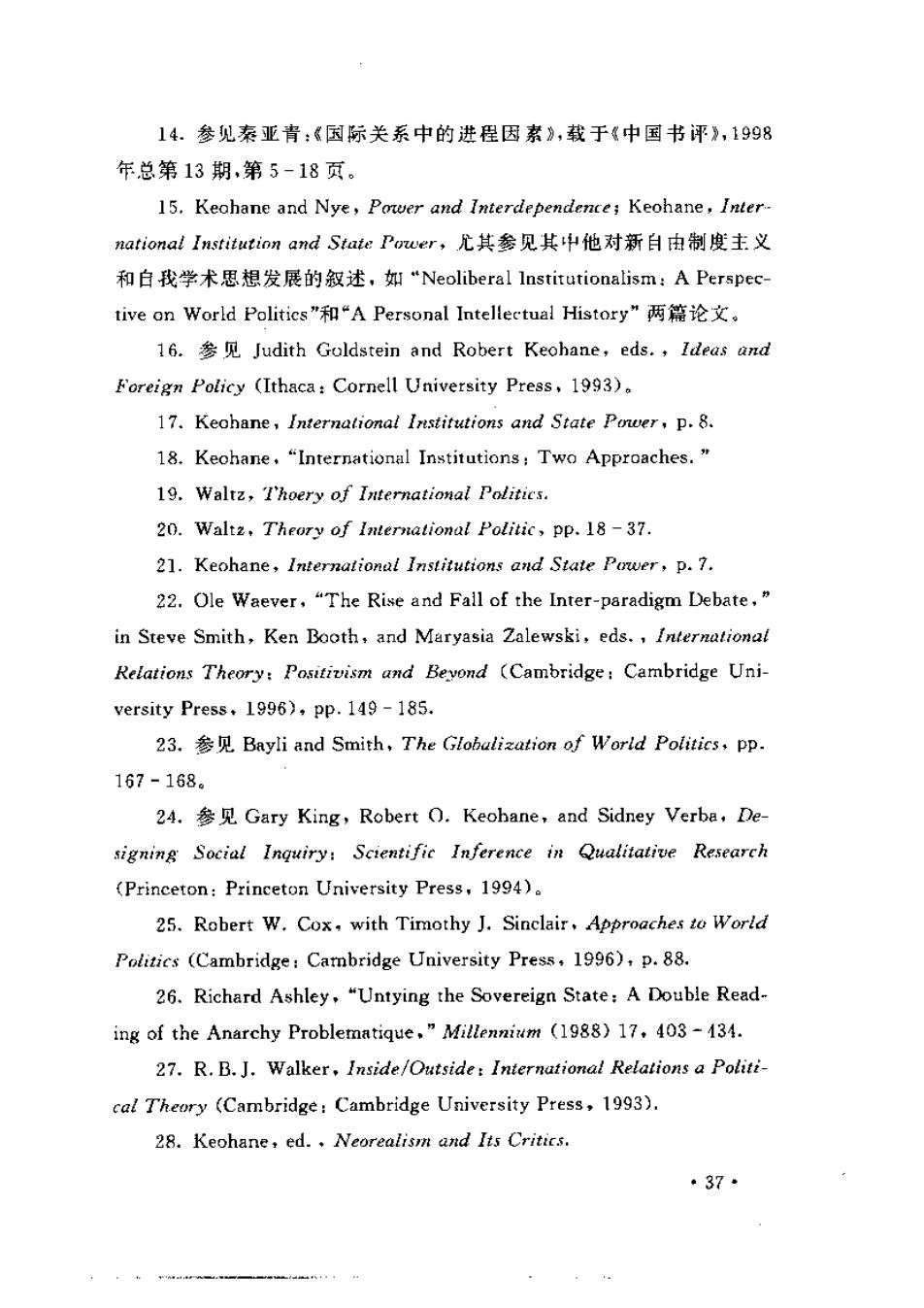
14.参见秦亚青:《国际关系中的进程因素》,载于《中国书评》,1998 年总第13期,第5-18页。 15.Keohane and Nye,Power and Interdependence;Keohane,Inter- national Institution and State Power,尤其参见其中他对新白由制度主.义 和白我学术思想发展的叙述,如“Neoliberal Institutionalism:A Perspec- tive on World Politics'"和“A Personal Intellectual History”两篇论文。 16.Judith Goldstein and Robert Keohane,eds.,Ideas and Foreign Policy (Ithaca:Cornell University Press,1993). 17.Keohane,International Institutions and State Power,p.8. 18.Keohane,"International Institutions:Two Approaches. 19.Waltz,T'hoery of International Politics. 20.Waltz,Theory of International Politic,pp.18-37. 21.Keohane,International Institutions and State Power,p.7. 22.Ole Waever,"The Rise and Fall of the Inter-paradigm Debate, in Steve Smith,Ken Booth,and Maryasia Zalewski,eds.,International Relations Theory:Positivism and Beyond (Cambridge:Cambridge Uni- versity Press,1996),pp.149-185. 23.Bayli and Smith,The Globulization of World Politics,pp. 167-168。 24.Gary King,Robert O.Keohane,and Sidney Verba,De- signing Social Inquiry:Scientific Inference in Qualitative Research (Princeton:Princeton University Press,1994). 25.Robert W.Cox,with Timothy J.Sinclair,Approaches to World Politics (Cambridge:Cambridge University Press,1996),p.88. 26.Richard Ashley,"Untying the Sovereign State:A Double Read- ing of the Anarchy Problematique,"Millennium (1988)17,403-134. 27.R.B.J.Walker,Inside/Outside:International Relations a Politi- cal Theory (Cambridge:Cambridge University Press,1993). 28.Keohane,ed.Neorealismn and Its Critics. ·37·
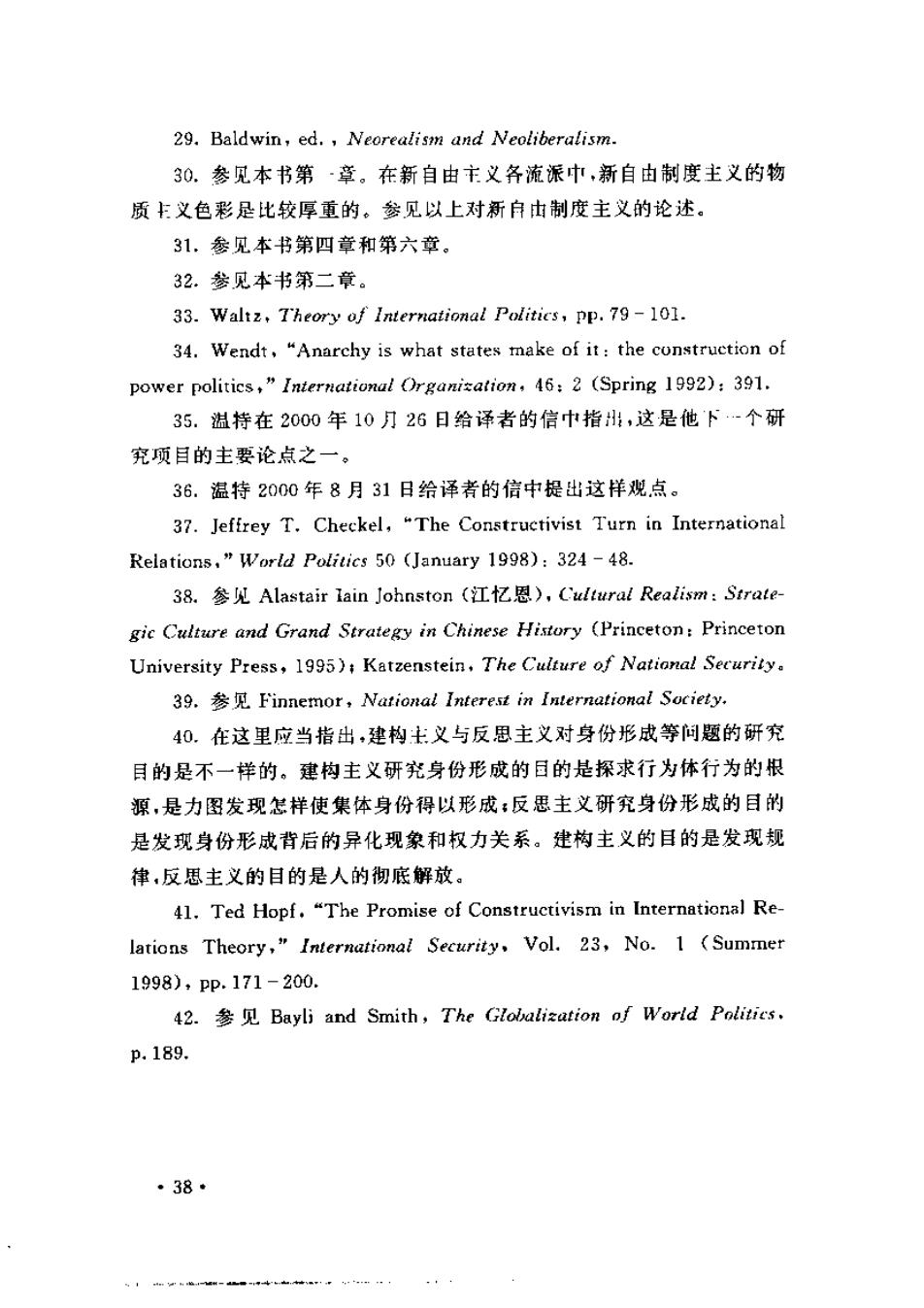
29.Baldwin,ed.,Neorealism and Neoliberalism. 30.参见本书第·章。在新自由主义各流派中,新自由制度主义的物 质王义色彩是比较厚重的。参见以上对新自由制度主义的论述。 31.参见本书第四章和第六章。 32.参见本书第二章。 33.Waltz,Theory of International Politics,pp.79-101. 34.Wendt,"Anarchy is what states make of it:the construction of power politics,"International Organization,46:2 (Spring 1992):391. 35.温持在2000年10刀26日给译者的信中指:,这是他下-个研 究项目的主要论点之一。 36.温特2000年8月31日给译若的信中提出这样规点。 37.Jeffrey T.Checkel,"The Constructivist Turn in International Relations,"World Politics 50 (January 1998):324-48. 38.参见Alastair lain Johnston(江t忆恩),Cultural Realism:Strate- gic Culture and Grand Strategy in Chinese History (Princeton:Princeton University Press,1995)+Katzenstein,The Culture of National Security. 39.Finnemor,National Interest in International Society. 40.在这里应当指出,建构主:义与反思主义对身份形成等问题的研究 目的是不一样的。建构主义研究身份形成的目的是探求行为体行为的根 源,是力图发现怎样使集体身份得以形成:反思主义研究身份形成的目的 是发现身份形成背后的异化现象和权力关系。建构主义的目的是发现规 律,反思主义的目的是人的彻底解放。 41.Ted Hopf,"The Promise of Constructivism in International Re- lations Theory,"International Security,Vol.23,No.1 (Summer 1998),Pp.171-200. 42.Bayli and Smith,The Globalization of World Politics. p.189. ·38·
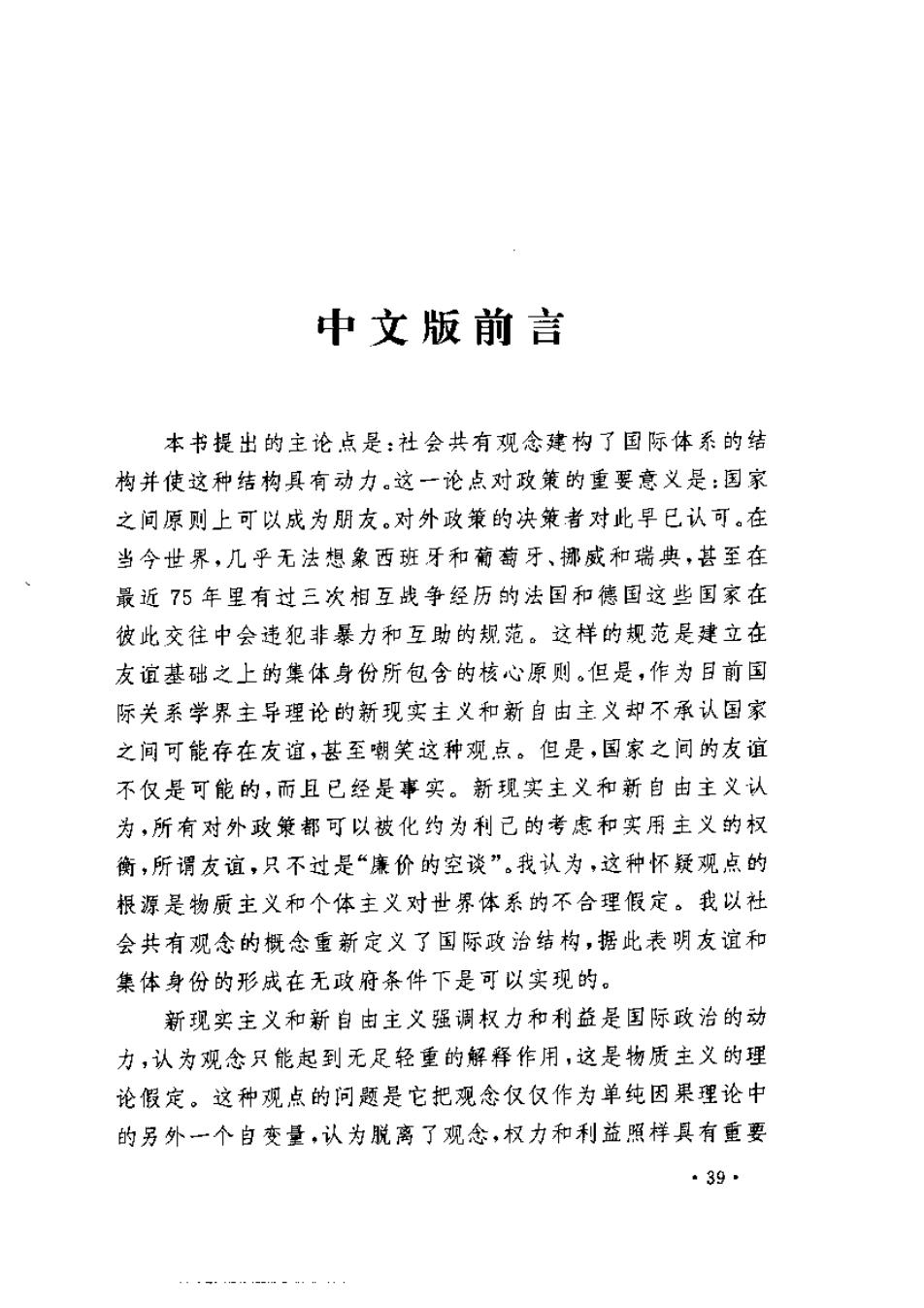
中文版前言 本书提出的主论点是:社会共有观念建构了国际体系的结 构并使这种结构具有动力。这一论点对政策的重要意义是:国家 之间原则上可以成为朋友。对外政策的决策者对此早已认可。在 当今世界,几乎无法想象西班牙和葡萄牙、挪威和瑞典,甚至在 最近75年里有过三次相互战争经历的法国和德国这些国家在 彼此交往中会违犯非暴力和互助的规范。这样的规范是建立在 友谊基础之上的集体身份所包含的核心原则。但是,作为目前国 际关系学界主导理论的新现实主义和新自由主义却不承认国家 之间可能存在友谊,甚至嘲笑这种观点。但是,国家之间的友谊 不仅是可能的,而且已经是事实。新现实主义和新自由主义认 为,所有对外政策都可以被化约为利己的考虑和实用主义的权 衡,所谓友谊,只不过是“廉价的空谈”。我认为,这种怀疑观点的 根源是物质主义和个体主义对世界体系的不合理假定。我以社 会共有观念的概念重新定义了国际政治结构,据此表明友谊和 集体身份的形成在无政府条件下是可以实现的。 新现实主义和新自由主义强调权力和利益是国际政治的动 力,认为观念只能起到无足轻重的解释作用,这是物质主义的理 论假定。这种观点的问题是它把观念仅仅作为单纯因果理论中 的另外一个白变量,认为脱离了观念,权力和利益照样具有重要 ·39·